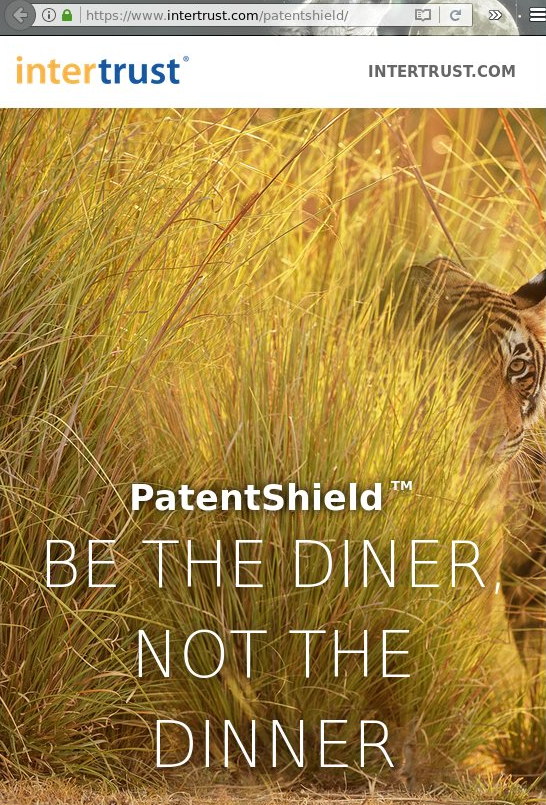

FIGHTING patents with patents is a worthless exercise of endless war and sometimes just reckless stockpiling which accomplishes nothing at all. We wrote about this in relation to Red Hat 8 years ago.
"This is why Microsoft loves using trolls as satellites, including Intellectual Ventures, which has thousands of satellites of its own and is controlled by Microsoft."A decade or more ago, around 2005, Red Hat helped fight against software patents at the EPO, but later on both Red Hat and Google started accumulating software patents of their own, falsely arguing that they need these for "defence". Acacia, a patent troll with Microsoft connections, repeatedly disproved them. One cannot sue trolls; there's nothing to sue over. This is why Microsoft loves using trolls as satellites, including Intellectual Ventures, which has thousands of satellites of its own and is controlled by Microsoft.
"There is a lot of hype this morning about PatentShield, which wrongly assumes that what we need to shield us from patent attacks are more patents."Not too long ago Google bragged about something called "PAX" (or Pax, i.e. peace), which we criticised several times. It doesn't really help address the underlying problems. It tackles neither trolls nor software patents. See this latest new example where the buzzword "AI" gets used as a loophole for post-Alice software patent grants. There were two puff pieces about it this morning [1, 2], the latter of which says: "A new patent for “whole brain” systems for autonomous robotic control has been issued by the U.S. Patent Office to Neurala, the software company that invented The Neurala Brain, a deep learning neural networks platform. This new invention will enable AI to function more like a human brain because it integrates multiple brain areas."
I have personally developed programs in this area (machine learning, autonomous vehicles etc.) and it's abundantly clear that it's all about software.
"What PatentShield is likely to accomplish is little but distraction from the real solutions (which Google isn't genuinely interested in)."There is a lot of hype this morning about PatentShield, which wrongly assumes that what we need to shield us from patent attacks are more patents. We found quite a few articles early this morning [1, 2, 3, 4, 5, 6], accompanying several copies of the press release (there was clearly a large, well-coordinated effort to get the word out, including paid press releases and probably PR agencies). No doubt there are many more articles on the way and almost none will go beyond repeating quotes from the press release (and those who paid for these, or their PR agents).
For those who think that PatentShield is a sort of "Eureka moment" or some brilliant thing "to Defend Startups from Patent Litigation" (as the headline of the press release claims) we have a good offer; land on the Moon and on Mars!
"Microsoft, for instance, habitually sends out trolls to attack its competition."What PatentShield is likely to accomplish is little but distraction from the real solutions (which Google isn't genuinely interested in). Meanwhile, MOSAID (now known as Conversant) gears up for more litigation. IAM has just been writing about this Microsoft-fed patent troll that pays IAM too. "According to USPTO data," IAM wrote yesterday, "Conversant was assigned 29 US patent assets by Seoul-based semiconductor foundry Dongbu HiTek and its affiliate Dongbu Electronics in a transfer executed at the end of last year. The patents appear to relate to CMOS image sensor technology."
It's not hard to imagine what will happen next. The industry is already suffering from trolls abundance (there is a new site called "Don't Bully My Business") and Conversant/MOSAID is just one of many. Microsoft, for instance, habitually sends out trolls to attack its competition. It's a convenient loophole. Microsoft is like Qualcomm in that sense and regarding the FTC (critic of PAEs in its recent report) which we wrote about some days ago, IAM says this:
The FTC’s case against Qualcomm was filed amid the dying embers of the Obama White House and accused the chipmaker of anti-competitive practices in the supply of its baseband processors and in its patent licensing. But the move was not without controversy. In a 2-1 decision in favour of bringing the suit, Commissioner Maureen Ohlhausen wrote a strongly worded dissent in which she claimed the court action was “based on a flawed legal theory”. Trump has appointed Ohlhausen the acting FTC chairman as the administration searches for a permanent appointee and, should the new head share her sentiments, the government’s support of the suit against Qualcomm may become lukewarm at best. The letter is a clear attempt to try to ensure that doesn’t happen.